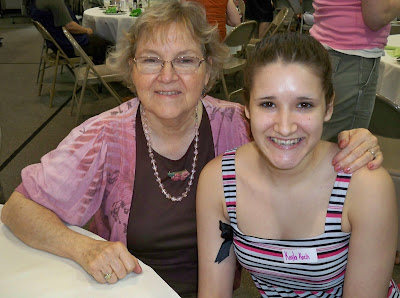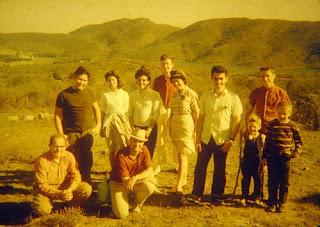"5 great things about getting older" (June 2011 Real Simple, 71). Experts ranging from ages 55 to 89 share their findings.
1. You'll be happier.
"...research has shown that as we age we become more emotionally stable and content." The big life questions have already been dealt with, so you can relax.
2. Wise decisions will come more easily.
"Scientists used to think that we lose a significant number of our brain cells as we age, but more sophisticated scans have debunked that theory." And "older brains can swiftly make the right calls." The good news is that "we hit our cognitive peak between the ages of 40-68." The bad news is I only have one peak-year left!
3. The fashion police will be off your back.
You no longer need to wear high heels! "...one of the greatest contributors to longevity is moving--fast on flat feet."
But, do I really want to live that long? Maybe I'll go back to wearing heels, especially considering my shrinking status.
4. You'll know who you are.
Betty Reid Soskin, 89, full-time park ranger says, "Before I was 75, I was tentative about many things. But now I know my own voice, and most important, I have the confidence to use it. Today I'm blogging and giving speeches and participating in all sorts of activities that, honestly, I would have been incapable of in my 60's."
Hey, longevity may not be so bad, there's a lot more to come!
5. You'll have time on your hands.
"If you've been driving yourself for years--working, raising a family, or both..." (yes, both!) "...it's an adjustment..."
True, however, I find myself more focused and driven now to do the things I have put off for so long. And as the previous expert says, "A sense of urgency comes with aging."
"Aging" written by a local professor, Bill Ringenberg, from his book Letters to Young Scholars, a few quotes:
"The senior period is a time for self-development as much and in some ways more than the earlier periods. Perhaps physical decline is designed to spur deepened spiritual and psychological growth at the end of life. Ideally, age should produce wisdom, increased poise, humble self-confidence, a more realistic self appraisal, and a reduced level of anxiety."
Recognizing that the aging process is different for everyone, there are principles that characterize the most all-around-fruitful experiences, says Dr. Ringenberg.
1. Accept the inevitable but retain control over the controllable.# 3 resonates with me on several levels.
2. Use the increased discretionary time to meditate deeply on the meaning of life and death. More important than what one does in the senior years is what one is becoming.
3. Change the mental focus away from work to leisure. Away from getting to giving, and away from controlling to counseling...Indeed the development of interpersonal relationships with people of all types is one of the most essential activities for seniors.
--Recently I allowed myself a leisure-type additional activity--an oil painting class. I say it is only for the duration of this birthday month, but we'll see what happens.
--One focus of my retirement years is to get rid of stuff! I so do NOT want to leave the mess to my children to sort through.
--Another aspect I very much want to cultivate at this time is cheerful, generous giving. A need came to my attention in the last couple weeks from a friend in Uruguay, and I can't think of a better way to spend birthday monies. These are excerpts from his letter, my translation:
Uruguay is not a poor country, but rather a rich nation with poverty of spirit...
I have recently taken on a new challenge to meet urgent needs of people, not necessarily their material needs, but to enrich their souls and for their eternal future. Thanks to the Rotary Club...I managed to have them give me a space in their building for computer classes for senior citizens who not only want to use this means of communication, but also need to be with others, to get out of their lethargy, their routine. As one of them said to me recently, "As soon as the sun rises I am waiting for it to set so I can go back to bed."
I believe it is our obligation to attend to all that is at hand, and this has come to me not because I was looking for it, but because God Himself placed it before me.
I have only the meeting place in the building, four old computers with a memory of 384 kb, when the minimum ought to be 1M; some chairs that are somewhat unsafe for the elderly; no heater; not even a corner to make coffee or tea and serve cookies.
I am doing this because God has asked me to and because I want to, and if I want to and God wants it, then nothing can stop us. But truthfully we need gas, internet, other computers, some chairs, a rug, and even money for transportation to the place.
Every Wednesday, probably Fridays, and most likely we will add days as there is great need of affection, love, comfort, peace, and all that the Lord can give and will give. To reach them through information services is only the first step to a dialogue about their needs. Already in two classes, one person opened her heart and shared her desperation.
Dr. Ringenberg's article admits, mostly for our country, that in spite of uncertain current economic realities, "the status of the senior population is better economically than it is socially and psychologically," the author offers ways to increase the quality of life for the aging.
1. Work intentionally to develop a general milieu which increasingly respects and appreciates seniors. Condescension toward and contempt for the old is a major problem in western culture.I especially appreciate #1. I will start by posting the most recent photo of myself, unflattering though it may be.
2. Develop systems that naturally incorporate the skills of seniors with societal needs.
3. Organize educational systems that provide continued physical and mental stimulation.
In a society where youth is idolized, maybe it is time to say "Old is beautiful!"








